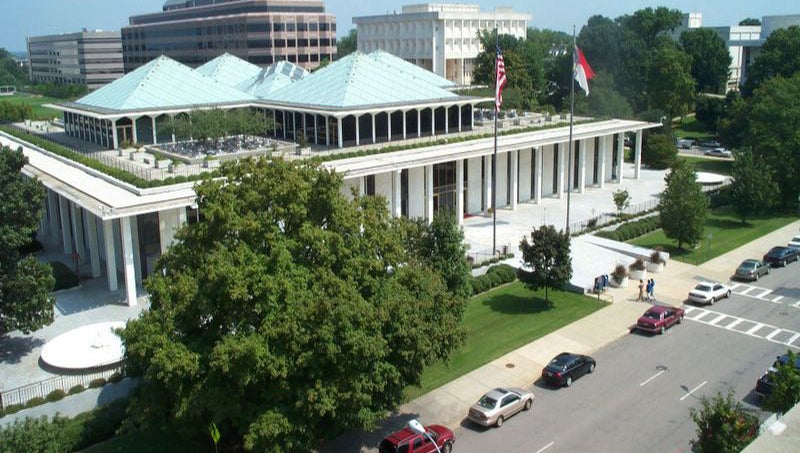General Assembly works towards coronavirus relief bill
Published 6:38 pm Friday, May 1, 2020

- (N.C. General Assembly)
|
Getting your Trinity Audio player ready...
|
Meeting this week for the first time since January, the North Carolina General Assembly reconvened this week with a primary focus of addressing health and economic issues arising from the COVID-19 pandemic.
For both the N.C. House and N.C. Senate, a pair of far-reaching COVID-19 relief bills have taken priority this week, generating bipartisan support in both chambers.
Together the bills represent the General Assembly’s plans for allocating approximately $3.5 billion in federal funding from the $2.2 trillion CARES Act. On the one hand, House Bill 1043, the “Pandemic Response Act, allocates $1.7 billion to respond to the pandemic. Senate Bill 704, meanwhile, the “COVID-19 Recovery Act,” allocates $1.3 billion for the same purpose.
With two different bills, however, the two chambers will have to reach a compromise before sending a bill to N.C. Gov. Roy Cooper to sign into law.
Here are some of the highlights of the legislation:
- Both bills allocate funds for the Golden LEAF Foundation to provide emergency loans to small businesses. While the Senate bill allocates $125 million for the purpose, the House proposal sets aside $75 million for that purpose.
- In terms of healthcare, the legislation sets aside millions of dollars in funds for COVID-19 testing, contact tracing, trend monitoring and research at North Carolina hospitals and universities.
- Local governments can also be eligible to receive relief funds to help cover the cost of COVID-19 response.
- Both bills provide waivers for certain educational requirements on testing, grading and school performance for the current school year. The bills also provide millions of dollars for summer learning programs, and set a date of Aug. 17 for schools to start back this fall.
The General Assembly is scheduled to reconvene Saturday to delve into the details of a compromise bill.
LOCAL PERSPECTIVES
For both N.C. Senator Erica Smith and N.C. Representative Keith Kidwell, the priority at hand is getting needed relief to North Carolinians who have been adversely affected by COVID-19 and the subsequent economic distress the pandemic has caused.
“I voted in the affirmative on S.B. 704, COVID-19 Recovery Act, that appropriates $1.3 billion in funds response to the pandemic,” Smith wrote in a statement. “While the bill passed unanimously, there is recognition that this is just a first step in fulfilling our constitutional duty to appropriate these funds per federal authorizations in providing for the public health and economic well-being of the citizens of our state.”
Smith said she was spending Friday analyzing H.B. 1043.
“In my initial analysis, I favor the House version as it secures critical education funding and flexibility, digital technology and broadband access for consumers and more funding and flexibility for local governments, which are our critical partners in facilitating the recovery process,” Smith wrote. “Our next wave of appropriations must do more for small businesses in NC.”
For Kidwell, the hope is that the General Assembly will be able to have a compromise bill hammered out over the weekend to present to the governor early next week. Both HB 1033 and SB 704 passed their respective chambers almost unanimously earlier this week, with only one House member voting no.
“(Saturday), we should have a completed, single COVID-19 bill that we’re hoping will cover most everything possible, but we’re fairly confident we’ll have to go back and do some additional tweaking as we move forward,” Kidwell said. “It’s going to be one whole bill that will either be the Senate’s origin bill our origin bill. It really doesn’t matter whose it is, as long as we get the work done.”
EXTRA INNINGS?
Outside of H.B 1043, a number of legislators in the House also introduced bills this week, including Kidwell, who filed a bill proposing an amendment to the North Carolina Constitution. Under H.B. 1033, the General Assembly would be required to come back into session within 15 days whenever the governor declares a statewide state of emergency.
“My position is, if things are so bad in North Carolina that the Governor must declare a statewide emergency, the people elected to represent the people of North Carolina should be at the House doing our job,” Kidwell said. “A lot of what we are doing right now should have been done back in March and April.”
Kidwell says he would support additional checks on the Governor’s power, including a change to the Emergency Powers Act to require consensus from the Council of State to shut down the state for an indefinite period of time. Smith, however, says that Kidwell’s proposed amendment seems to preempt the power of the executive branch.
“A proposed constitutional change to provide for convening of the legislature upon a gubernatorial executive order state of emergency is unnecessary, as there already exists that provision through Article 2, Sec. 11.(2) ‘convention by three-fifths of each chamber,’” Smith wrote. “I am a disciplined supporter of ‘trias politica’ separation of powers, found in Article 1, Sec. 6 of the N.C. Constitution. Rather than propose amendments to the state constitution that appear to ‘overreach into’ or limit the powers of the executive branch, I would challenge all legislators to explore amendments that expand representative democracy and protections for all citizens, beginning with constitutional protections for women and girls under N.C. Ratify the Equal Rights Amendment.”
Smith’s full response to request for comment can be found here.





